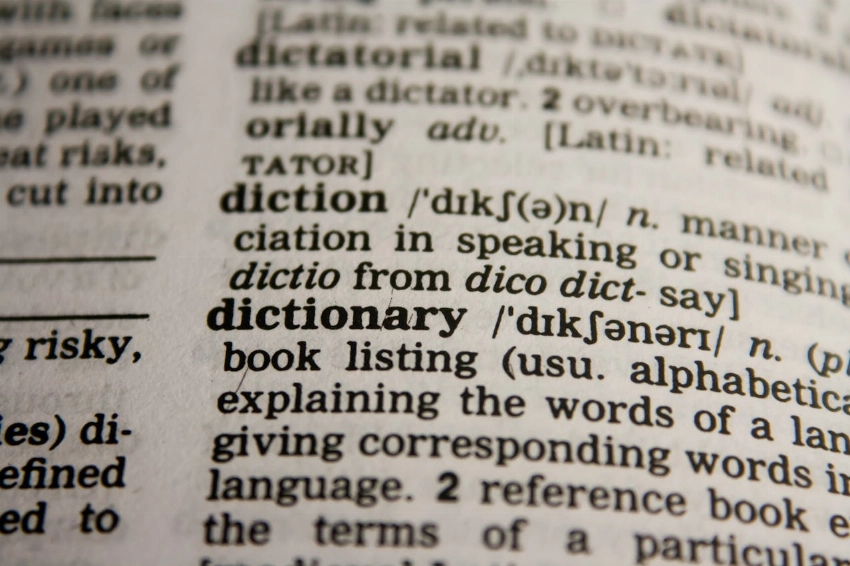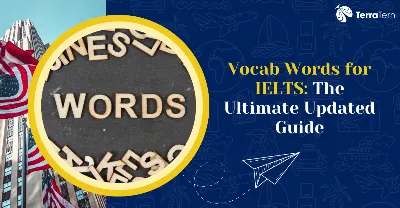Key Highlights
- Latest Facts & News About IELTS Vocabulary (2025)
- Why IELTS Vocabulary Matters for Your Band Score in 2025
- 300 Vocab Words for IELTS: The Essential List in 2025
- IELTS Common Words for Vocab: High-Frequency & Topic-Wise Lists in 2025
- Latest Advanced IELTS Vocabulary: Synonyms, Antonyms, and Idioms
- Latest Strategies to Expand Your IELTS Vocabulary Fast
- How to Use Vocab Words for IELTS in Writing & Speaking in 2025?
- Free Resources: Download IELTS Vocab PDFs, Flashcards & Apps 2025
- Conclusion
Building a strong vocabulary is key to success in the IELTS exam. Learning the right vocab words for IELTS helps improve your performance in Listening, Reading, Writing, and Speaking. This guide highlights IELTS common words for vocab and includes a list of 300 vocab words for IELTS to boost your score and confidence in 2025.
Latest Facts & News About IELTS Vocabulary (2025)
To meet these rising standards, it's essential to focus on vocab words for IELTS that are not only advanced but also contextually appropriate exactly what examiners are looking for in 2025.
-
Vocabulary nowadays constitutes 25% of the Writing and Speaking band scores; this usually casts a higher significance on vocabulary for high achievers than ever before.
-
The IELTS Academic Word List of 2025 has grown to contain greater emphasis on synonyms, antonyms, and idiomatic expressions.
-
Examiner rewards advanced vocabulary that is contextual and precise, rather than that which has been simply memorised out of word lists.
-
Specific vocabulary and collocations are now gaining weight in the assessment criteria for both Speaking and Writing.
-
Digital flashcards and AI-oriented practice tools are trending for IELTS preparation.
-
The average IELTS Speaking band score is 6.5 in the world; however, targeted vocabulary lists are linked to higher scores.
-
Recently, Speaking topics in 2025 include the environment, technology, and social trends.
-
More universities require a minimum score of 7.0 in Speaking and Writing, thus raising the vocabulary mastery standard.
-
Examiner reports highlight contextual association of vocabulary as primarily important for Band 7+ success.
-
Search results under "People Also Search For" and "People Also Ask" on Google are among the best sources to learn about new IELTS vocabulary resources.
Also Read: Documents Required for IELTS Exam: Latest Checklist
Why IELTS Vocabulary Matters for Your Band Score in 2025

A very important part played by vocab words for IELTS tests is their great role in achieving one of the sought-after IELTS scores. You'll see that whether you're shooting for a 6.5 or gunning for Band 8, the way your score would stack up on the Listening, Reading, Writing, and Speaking parts of your test would depend on your diction.
-
Listening: Recognising synonyms, paraphrases, and different expressions tends to help one better appreciate the speaker's intention, and additionally avoids falling into traps set in the multiple-choice or matching questions.
-
Reading: A Vast vocabulary range would suffice in quickly comprehending a complex text, especially when dealing with academic language and unfamiliar topics.
-
Writing: The lexical resource criteria, which amount to 25% of the weight of your Writing band score, rate your ability to use different but very precise and topic-specific words. Repeating the same word or wrong choice of words or using very basic vocabulary can limit even someone to Band 6 or lower.
-
Speaking: Lexical resources are assessed similarly to Writing. For a Band of 7 and higher, idiomatic expressions, collocations, and topic-related vocabulary should be used naturally and accurately.
300 Vocab Words for IELTS: The Essential List in 2025

If you are preparing to take the IELTS in 2025, you should know that it will be impossible to survive without mastering good and essential vocab words for IELTS. This is a careful compilation of 300 vocab words for IELTS that will assist you in having a strong lexical foundation necessary for increasing your Speaking, Writing, Reading, and Listening scores.
|
Word |
Meaning |
Synonym |
Example Sentence |
|
Abundant |
Present in large quantities |
Plentiful, ample |
The rainforest has an abundant variety of species. |
|
Alleviate |
To reduce or ease |
Relieve, lessen |
The medicine helped alleviate her pain. |
|
Boast |
To proudly possess or display |
Flaunt, exhibit |
The city boasts a rich cultural history. |
|
Candid |
Honest and straightforward |
Frank, direct |
She gave a candid opinion during the interview. |
How to Memorize the 300 Vocab Words for IELTS?
Learning all 300 vocab words for IELTS may be heavy on the head, but it is achievable with the right techniques. Here are some tried-and-tested approaches for effective learning and prolonged retention of the IELTS vocab:
-
Spaced Practice: Anki or Quizlet-style spaced repetition forces you to remember new words over time rather than cramming.
-
Create Digital Flashcards: Divide IELTS vocabulary lists into smaller groups. Create a digital flashcard with the definition, synonyms, and sample sentences of each word.
-
Learn in Context: Read sample IELTS essays and listen to interviews or podcasts about some common IELTS issues (like technology, environment, or society), which will reinforce learning how those words are used naturally.
-
Use the Words Actively: Practice writing IELTS essays where you include 5-10 new words every time. Register and speak about using the words in your Speaking responses to enhance fluency and contextual understanding.
-
Track Your Progress: You can use checklists or apps to keep track of how many of the 300 vocab words for IELTS you've learned and which ones need more review.
Also Read: Everything About IELTS Learning & Exam Is Right Here!
IELTS Common Words for Vocab: High-Frequency & Topic-Wise Lists in 2025
Familiarising yourself with the IELTS common words for vocab is crucial for enhancing your band score. This section looks at high-frequency vocab words for IELTS grouped by the common test topics on your exam. By mastering the IELTS common words for vocab, you will thereby increase vocab words for IELTS relevant to its 2025 examination use.
Topic-Wise IELTS Vocabulary Lists (2025)
IELTS vocabulary essentials are here segmented by common test topics. Words come with their definitions as well as with example sentences so as to learn each in the context, best for improving both your IELTS common words for vocabulary and application.
1. Education
The essential vocabulary for IELTS tests related to education:
-
Curriculum – the courses that constitute a course of study.
Example: Schools need to frequently revise their curriculum in order to keep pace with global standards.
-
Literate – characterised by the ability to read and write.
Example: The government executed a massive program in helping adults acquire literacy.
-
Tuition – payment made for teaching.
Example: University tuition fees are rising every year.
-
Scholarship – money given to students as financial support.
Example: She was given a full scholarship owing to her high grades.
2. Environment
Above are the high-frequency words for IELTS to use often in environment topics:
-
Emissions – poisonous materials dispensed into the air.
Example: Car emissions must be reduced for clean air.
-
Conservation – the safeguards of nature and resources, including animals.
Example: Conservation efforts are very important for endangered species.
-
Sustainable – continuation of being maintained.
Example: Solar energy is a sustainable source that differs from fossil fuels.
-
Deforestation – the conversion of forests into clear land.
Example: Deforestation leads to the loss of biodiversity.
3.Technology
Popular vocab words for IELTS related technology discussions:
-
Innovation - an anthropogenic novel way or idea.
Example: Innovation drives progress in every industry.
-
Automation – the replacement of human labour by machines.
Example: Automation changes the process of factory operations.
-
Cybersecurity – protection of digital systems.
Example: Threats to cybersecurity increased with the trend of remote working.
-
Artificial Intelligence – the action of a machine simulating intelligence.
Example: Artificial Intelligence reforms healthcare and education.
4.Health
Topic-wise consonant voxels for health in IELTS:
-
Symptoms - signs of illness.
Example: Common signs of flu are fever and fatigue.
-
Diagnosis - recognition of a condition.
Example: Early diagnosis has better chances of a successful treatment.
-
Prevention - stop something before it happens.
Example: Exercise and diet are keys to disease prevention.
-
Mental health - emotional and psychological wellness.
Example: Mental health is as important as physical health.
Latest Advanced IELTS Vocabulary: Synonyms, Antonyms, and Idioms

Using strong vocab words for IELTS is essential for achieving a high band score. To improve your score, you need to go beyond basic words and learn IELTS advanced vocabulary such as synonyms, antonyms, and idiomatic expressions. These help you show variety and accuracy in your Speaking and Writing.
1. IELTS Synonyms
Using synonyms for common words shows a good range of vocabulary.
-
Important - Significant
Example: Climate change is a significant issue. -
Help - Assist
Example: Teachers assist students with their learning. -
Improve - Enhance
Example: Practice can enhance your skills.
2. IELTS Antonyms
Antonyms help you express contrast and comparison.
-
Increase - Decrease
Example: The population may increase, while resources decrease. -
Traditional - Modern
Example: Some prefer modern technology; others like traditional methods. -
Benefit - Harm
Example: Tourism can benefit the economy but also harm the environment.
3. IELTS Idioms
Using idioms correctly makes your language more natural.
-
A piece of cake (very easy)
Example: The test was a piece of cake. -
Break the ice (start a conversation)
Example: A joke helped break the ice during the interview. -
Hit the nail on the head (be exactly right)
Example: She hit the nail on the head with her answer.
Also Read: Minimum IELTS Score for Australia Work Visa: Latest Guide
Latest Strategies to Expand Your IELTS Vocabulary Fast
If you want a smart way to learn your vocab words for IELTS quickly, if you are aiming for a Band 7, then you do not have to just memorize random words. You will have to develop focused methods that are aimed at real use in the actual examination. Proven ways to efficiently and effectively build vocab words for IELTS are:
-
Reading and Listening to an IELTS-Level Literature
Expose yourself to academic articles, sample questions from IELTS reading passages, and English-language podcasts on popular IELTS topics (e.g., environment, education, technology). This gives you a chance to see vocab words used correctly in IELTS context and consolidates one's understanding.
-
Use Flashcards and Spaced Repetition
To study IELTS vocab fast, these apps, such as Anki, Quizlet, or Memrise, use spaced repetition. Decompose the set of the most important vocab words for IELTS into sets and review each of them daily.
-
Practice with AI-Powered Tools
Vocabulary trainers, mock tests, and AI-based speaking practice can all be done online to sharpen your skills using vocab words for IELTS in real time. Such services instantly provide feedback to their users, further hastening the learning process.
-
Write and Speak Every Day
You should use new words in your IELTS writing or speaking tasks. Even writing one or two sentences on a daily basis using targeted vocab words for IELTS will serve to reinforce their usage into long-term memory.
-
Review Topic-Wise Lists
The study of vocabulary related to frequently asked topics in IELTS (education, health, tech, etc.) is called a topic-wise approach. It's also a way of ensuring that you are studying words that will appear in the test.
How to Use Vocab Words for IELTS in Writing & Speaking in 2025?

It's one thing to learn vocab words for the IELTS, and it's a different thing altogether to use them naturally and accurately in your answers to really help bolster that band score. With both IELTS Writing Task 2 and IELTS Speaking, your lexical resource, as evaluated by the examiner, also includes your ability to use a wide range of vocabulary accurately. This includes the use of collocations in IELTS, paraphrasing, and words that are specific to a topic. Here is how you can effectively integrate vocab words for IELTS in both Writing and Speaking:
1. In IELTS Writing Task 2
-
Use strong IELTS collocations
-
Paraphrase the question using academic language
-
Include advanced transition words and topic-specific terms
2. In IELTS Speaking
-
Be natural and expressive
-
Use vocab words for IELTS that fit the tone of the conversation
-
Use idioms and phrasal verbs (appropriately)
-
Expand with details and examples
Common Mistakes with IELTS Vocabulary
Making incorrect vocab words for IELTS can risk your scores on the Writing/Speaking portions. Described below are some common pitfalls that candidates find themselves facing and some tips on how to avoid them.
-
Complex Word Overuse
-
Don't: Use high-sounding formalism or bad English words that you have never heard.
-
Do: Use ones that are contextually and linguistically correct.
-
Collocation Abuse
-
Don't: Use combinations of words native speakers wouldn't use.
-
Do: Use collocations typical of IELTS, such as táke action, ôlay a rôle, or pôse a risk.
-
Using the Same Words
-
Don't: Give answers that repeat the same words on several occasions.
-
Do: Give a range of synonyms or provide paraphrases wherever possible.
-
Using Idioms Wrongly
-
Don't: Use idioms that you are not clear about or that do not match the topic at hand.
-
Do: Use familiar IELTS idioms only when they fit naturally and clearly in the context.
Also Read: Is 7.5 a Good IELTS Score? Here is the Truth
Free Resources: Download IELTS Vocab PDFs, Flashcards & Apps 2025
Below, you'll find links to download IELTS vocab PDFs, explore IELTS flashcards free, and try out the best IELTS vocabulary app options.
-
300+ vocab words for IELTS with synonyms and topic-wise grouping
-
Printable for offline study
Conclusion
Mastering vocab words for IELTS is essential for achieving high band scores in 2025. Focusing on a targeted list, such as the 300 vocab words for IELTS, along with IELTS common words for vocab by topic, can significantly improve your performance in all test sections. Using advanced vocabulary accurately and practising regularly with free resources will boost your confidence and exam results. Start building your IELTS vocabulary today and take a confident step toward your desired band score! To know more, visit TerraTern now.








